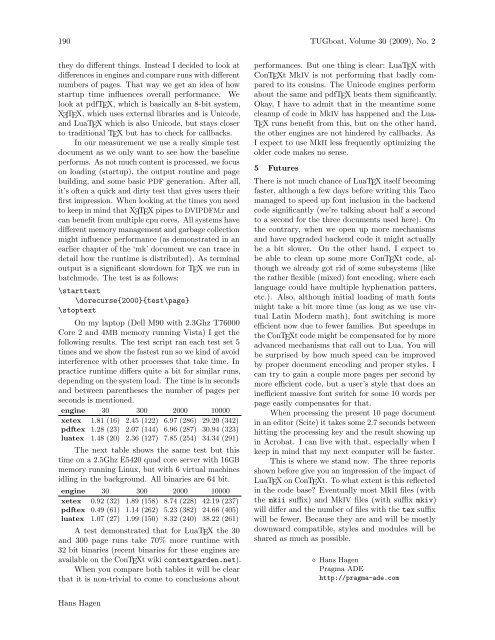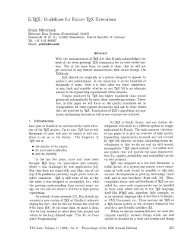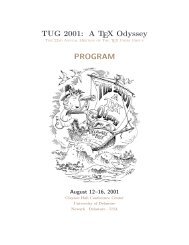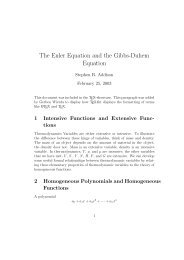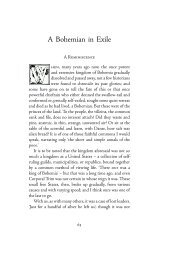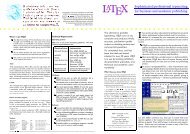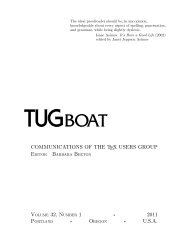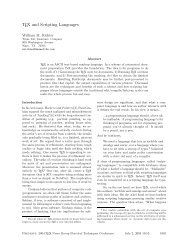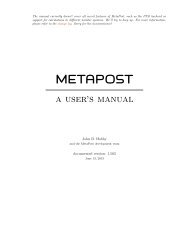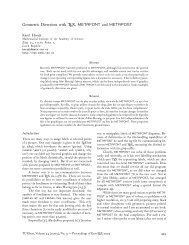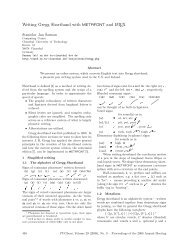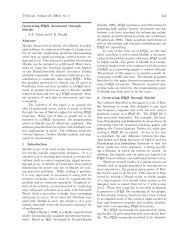The Communications of the TEX Users Group Volume 30 ... - TUG
The Communications of the TEX Users Group Volume 30 ... - TUG
The Communications of the TEX Users Group Volume 30 ... - TUG
You also want an ePaper? Increase the reach of your titles
YUMPU automatically turns print PDFs into web optimized ePapers that Google loves.
190 <strong>TUG</strong>boat, <strong>Volume</strong> <strong>30</strong> (2009), No. 2<br />
<strong>the</strong>y do different things. Instead I decided to look at<br />
differencesinenginesandcomparerunswithdifferent<br />
numbers <strong>of</strong> pages. That way we get an idea <strong>of</strong> how<br />
startup time influences overall performance. We<br />
look at pdf<strong>TEX</strong>, which is basically an 8-bit system,<br />
XE<br />
<strong>TEX</strong>, which uses external libraries and is Unicode,<br />
and Lua<strong>TEX</strong> which is also Unicode, but stays closer<br />
to traditional <strong>TEX</strong> but has to check for callbacks.<br />
In our measurement we use a really simple test<br />
document as we only want to see how <strong>the</strong> baseline<br />
performs. As not much content is processed, we focus<br />
on loading (startup), <strong>the</strong> output routine and page<br />
building, and some basic PDF generation. After all,<br />
it’s <strong>of</strong>ten a quick and dirty test that gives users <strong>the</strong>ir<br />
first impression. When looking at <strong>the</strong> times you need<br />
to keep in mind that XE<br />
<strong>TEX</strong> pipes to DVIPDFMx and<br />
can benefit from multiple cpu cores. All systems have<br />
differentmemorymanagementandgarbagecollection<br />
might influence performance (as demonstrated in an<br />
earlier chapter <strong>of</strong> <strong>the</strong> ‘mk’ document we can trace in<br />
detail how <strong>the</strong> runtime is distributed). As terminal<br />
output is a significant slowdown for <strong>TEX</strong> we run in<br />
batchmode. <strong>The</strong> test is as follows:<br />
\starttext<br />
\dorecurse{2000}{test\page}<br />
\stoptext<br />
On my laptop (Dell M90 with 2.3Ghz T76000<br />
Core 2 and 4MB memory running Vista) I get <strong>the</strong><br />
following results. <strong>The</strong> test script ran each test set 5<br />
times and we show <strong>the</strong> fastest run so we kind <strong>of</strong> avoid<br />
interference with o<strong>the</strong>r processes that take time. In<br />
practice runtime differs quite a bit for similar runs,<br />
depending on <strong>the</strong> system load. <strong>The</strong> time is in seconds<br />
and between paren<strong>the</strong>ses <strong>the</strong> number <strong>of</strong> pages per<br />
seconds is mentioned.<br />
engine <strong>30</strong> <strong>30</strong>0 2000 10000<br />
xetex 1.81 (16) 2.45 (122) 6.97 (286) 29.20 (342)<br />
pdftex 1.28 (23) 2.07 (144) 6.96 (287) <strong>30</strong>.94 (323)<br />
luatex 1.48 (20) 2.36 (127) 7.85 (254) 34.34 (291)<br />
<strong>The</strong> next table shows <strong>the</strong> same test but this<br />
time on a 2.5Ghz E5420 quad core server with 16GB<br />
memory running Linux, but with 6 virtual machines<br />
idling in <strong>the</strong> background. All binaries are 64 bit.<br />
engine <strong>30</strong> <strong>30</strong>0 2000 10000<br />
xetex 0.92 (32) 1.89 (158) 8.74 (228) 42.19 (237)<br />
pdftex 0.49 (61) 1.14 (262) 5.23 (382) 24.66 (405)<br />
luatex 1.07 (27) 1.99 (150) 8.32 (240) 38.22 (261)<br />
A test demonstrated that for Lua<strong>TEX</strong> <strong>the</strong> <strong>30</strong><br />
and <strong>30</strong>0 page runs take 70% more runtime with<br />
32 bit binaries (recent binaries for <strong>the</strong>se engines are<br />
available on <strong>the</strong> Con<strong>TEX</strong>t wiki contextgarden.net).<br />
When you compare both tables it will be clear<br />
that it is non-trivial to come to conclusions about<br />
Hans Hagen<br />
performances. But one thing is clear: Lua<strong>TEX</strong> with<br />
Con<strong>TEX</strong>t MkIV is not performing that badly compared<br />
to its cousins. <strong>The</strong> Unicode engines perform<br />
about <strong>the</strong> same and pdf<strong>TEX</strong> beats <strong>the</strong>m significantly.<br />
Okay, I have to admit that in <strong>the</strong> meantime some<br />
cleanup <strong>of</strong> code in MkIV has happened and <strong>the</strong> Lua-<br />
<strong>TEX</strong> runs benefit from this, but on <strong>the</strong> o<strong>the</strong>r hand,<br />
<strong>the</strong> o<strong>the</strong>r engines are not hindered by callbacks. As<br />
I expect to use MkII less frequently optimizing <strong>the</strong><br />
older code makes no sense.<br />
5 Futures<br />
<strong>The</strong>re is not much chance <strong>of</strong> Lua<strong>TEX</strong> itself becoming<br />
faster, although a few days before writing this Taco<br />
managed to speed up font inclusion in <strong>the</strong> backend<br />
code significantly (we’re talking about half a second<br />
to a second for <strong>the</strong> three documents used here). On<br />
<strong>the</strong> contrary, when we open up more mechanisms<br />
and have upgraded backend code it might actually<br />
be a bit slower. On <strong>the</strong> o<strong>the</strong>r hand, I expect to<br />
be able to clean up some more Con<strong>TEX</strong>t code, although<br />
we already got rid <strong>of</strong> some subsystems (like<br />
<strong>the</strong> ra<strong>the</strong>r flexible (mixed) font encoding, where each<br />
language could have multiple hyphenation patters,<br />
etc.). Also, although initial loading <strong>of</strong> math fonts<br />
might take a bit more time (as long as we use virtual<br />
Latin Modern math), font switching is more<br />
efficient now due to fewer families. But speedups in<br />
<strong>the</strong> Con<strong>TEX</strong>t code might be compensated for by more<br />
advanced mechanisms that call out to Lua. You will<br />
be surprised by how much speed can be improved<br />
by proper document encoding and proper styles. I<br />
can try to gain a couple more pages per second by<br />
more efficient code, but a user’s style that does an<br />
inefficient massive font switch for some 10 words per<br />
page easily compensates for that.<br />
When processing <strong>the</strong> present 10 page document<br />
in an editor (Scite) it takes some 2.7 seconds between<br />
hitting <strong>the</strong> processing key and <strong>the</strong> result showing up<br />
in Acrobat. I can live with that, especially when I<br />
keep in mind that my next computer will be faster.<br />
This is where we stand now. <strong>The</strong> three reports<br />
shown before give you an impression <strong>of</strong> <strong>the</strong> impact <strong>of</strong><br />
Lua<strong>TEX</strong> on Con<strong>TEX</strong>t. To what extent is this reflected<br />
in <strong>the</strong> code base? Eventually most MkII files (with<br />
<strong>the</strong> mkii suffix) and MkIV files (with suffix mkiv)<br />
will differ and <strong>the</strong> number <strong>of</strong> files with <strong>the</strong> tex suffix<br />
will be fewer. Because <strong>the</strong>y are and will be mostly<br />
downward compatible, styles and modules will be<br />
shared as much as possible.<br />
⋄ Hans Hagen<br />
Pragma ADE<br />
http://pragma-ade.com


